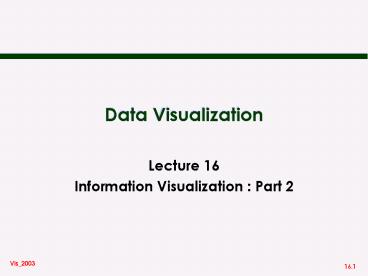Data Visualization - PowerPoint PPT Presentation
1 / 27
Title:
Data Visualization
Description:
Daisy Charts - Underground Problems. 16.9. Vis_2003. Networks ... Powerful search and retrieval engines. return documents based on some sort of keyword search ... – PowerPoint PPT presentation
Number of Views:57
Avg rating:3.0/5.0
Title: Data Visualization
1
Data Visualization
- Lecture 16
- Information Visualization Part 2
2
Glyph Techniques Star Plots
- Star plots
- Each observation represented as a star
- Each spike represents a variable
- Length of spike indicates the value
3
Chernoff Faces
- Chernoff suggested use of faces to encode a
variety of variables - can map to size, shape,
colour of facial features - human brain rapidly
recognises faces
4
Chernoff Faces
- Here are some of the facial features you can use
http//www.bradandkathy.com/software/faces.html
5
Chernoff Faces
- Demonstration applet at
- http//www.hesketh.com/schampeo/projects/Faces/
6
Chernoffs Face
- .. And here is Chernoffs face ?
http//www.fas.harvard.edu/stats/ Chernoff/Hcinde
x.htm
7
Daisy Charts
Dry
variables and their values placed around circle
Wet
Leeds
Showery
lines connect the values for one observation
Sahara
Saturday
Amazon
Sunday
http//www.daisy.co.uk
8
Daisy Charts - Underground Problems
9
Networks of Information
- In many applications of InfoVis, the observations
are linked in a graph structure - Directory trees
- Web sites
- We can still represent as a data table
- The link(s) appear as column(s) in the data table
1
2
3
Graph may be directed or undirected
10
Examples of Networks of Information
11
Graph Drawing Algorithms
- There are various general graph layout software
packages - Example is dotty from ATT suite called GraphViz
- Nodes of graph laid out automatically
- here an undirected graph
- applications?
http//www.research.att.com/sw/tools/graphviz/
12
Dotty
Directed graph for software engineering
application
13
Hierarchical Information
- Important special case is where information is
hierarchical - Graph structure can be laid out as a tree
http//www.cwi.nl/InfoVisu/Examples
14
Tree Maps
- Screen filling method which uses a hierarchical
partitioning of the screen into regions depending
on attribute values - Alternate partitioning parallel to X and Y axes
- Suitable for hierarchical type data
- size of files in a user directory
15
Tree Map of Filestore
Suppose user has three subdirectories A, B and
C First partition in X according to total size
of each sub- directory
16
Tree Map of Filestore
Then within each subdirectory, we can partition
in Y by the size of individual files, or
further subdirectories
17
Treemap Example
Usenet news groups
For history of treemaps see www.cs.umd.edu/ hcil/
treemap-history
Developed over many years by Ben Schneiderman and
colleagues
18
Hyperbolic Trees
- This is popular method of displaying hierarchical
structures such as Web sites - Place home page in centre
- with linked pages connected by hyperbolic arcs
- further arcs link to further links
- see www.acm.org/sigchi/chi95/proceedings/papers/j
l_bdy.htm
19
Hyperbolic Trees
Automobiles web site Home page in centre Click
on link you want ...
20
Hyperbolic Trees
Auto History moves to centre of screen Click
on next link...
21
Hyperbolic Trees
Henry Ford is now at the centre and so on...
22
Hyperbolic Trees
Also works for family trees...
www.inxight.com
23
Document Visualization
- Large collections of electronic text
- the Web is prime example!
- Powerful search and retrieval engines
- return documents based on some sort of keyword
search - How do we visualize the results of a query?
- www.itl.nist.gov/iaui/vvrg/cugini/uicd/nirve-home.
html
24
Document Retrieval
- Suppose search returns a keyword strength
- ie user enters a number of keywords
- engine returns list of documents
- each document has a score for each keyword
specified (eg number of occurrences) - most relevant document has largest total score
25
Document Spiral
Arrange docs in spiral, most relevant at centre
26
Document Three-Keyword Axes Display
One keyword per axis Plot docs in a scatter
plot using keyword strengths to position
along axes Same keyword on all axes lines docs
up on XYZ line
27
Nearest Neighbour Sequence
Choose one doc and place on circle Find the
closest in keyword strength space and
place adjacent to it.. .. and so on































